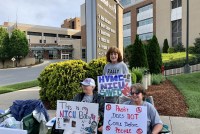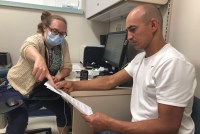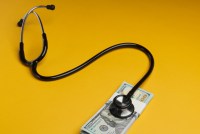Latest KFF Health News Stories
Covid Relief Payments Triggered Feds to Demand Money Back From Social Security Recipients
Some Social Security beneficiaries say the government is clawing back benefits after they received covid stimulus payments that were supposed to be exempt from asset limits.
Rare ‘Flesh-Eating’ Bacterium Spreads North as Oceans Warm
A rise in cases of Vibrio vulnificus and its spread northward have heightened concern about the bacterium, which can cause human tissue to rot and skin to decay. The Centers for Disease Control and Prevention is trying to make more doctors aware of the dangerous pathogen.
These Appalachia Hospitals Made Big Promises to Gain a Monopoly. They’re Failing to Deliver.
Ballad Health, the only hospital system across a large swath of Tennessee and Virginia, has fallen short of quality-of-care and charity care obligations — even as it’s sued thousands of patients for unpaid bills.
Social Security Overpayments Draw Scrutiny and Outrage From Members of Congress
Lawmakers are faulting the Social Security Administration for issuing billions of dollars of payments that beneficiaries weren’t entitled to receive — and then demanding the money back — in the wake of an investigation by KFF Health News and Cox Media Group.
Officials Agree: Use Settlement Funds to Curb Youth Addiction. But the ‘How’ Gets Hairy.
Parents, educators, and elected officials agree that investing in school-based prevention efforts could help curb the rising rate of youth drug overdoses. The well-known D.A.R.E. program is one likely choice, but its effectiveness is in question.
Journalists Recap How Smallpox Was Wiped Out and How Opioid Settlement Cash Is Being Paid Out
KFF Health News and California Healthline staff made the rounds on national and local media this week to discuss their stories. Here’s a collection of their appearances.
No existen normas federales para proteger a los trabajadores cuando los días son excesivamente calurosos. Y sin el apoyo bipartidista del Congreso, incluso con la atención urgente de la administración Biden, es posible que el alivio no llegue en años.
Workers Pay the Price While Congress and Employers Debate Need for Heat Regulations
Studies suggest official numbers vastly underestimate heat-related injuries and illness on the job. To institute protections, the government must calculate their cost — and the cost of inaction.
When Temps Rise, So Do Medical Risks. Should Doctors and Nurses Talk More About Heat?
The medical dangers of heat are real. But people often ignore public heat alerts or don’t realize how vulnerable they are. A new alert system prompts clinicians to talk about heat with patients.
Artificial Intelligence May Influence Whether You Can Get Pain Medication
To contain the opioid crisis, health and law enforcement agencies have turned to technology to monitor doctor and patient prescription data. Experts have raised questions about how these systems work and worry about their accuracy and potential biases. Some patients and doctors say they’re being unfairly targeted.
The Painful Pandemic Lessons Mandy Cohen Carries to the CDC
Mandy Cohen, the new director of the Centers for Disease Control and Prevention, earned praise for her leadership and communication as the face of North Carolina’s response to covid-19. People in the state’s most vulnerable communities tell a more complicated story.
Doctors and Patients Try to Shame Insurers Online to Reverse Prior Authorization Denials
Prior authorization is a common tool used by health insurers for many tests, procedures, and prescriptions. Frustrated by the process, patients and doctors have turned to social media to publicly shame insurance companies and elevate their denials for further review.
Life in a Rural ‘Ambulance Desert’ Means Sometimes Help Isn’t on the Way
No local hospital and anemic ambulance services mean residents in rural Pickens County, Alabama, are thrown into perilous situations when they have medical emergencies. It’s a kind of medical care roulette that has become a fact of life for rural Americans who live in ambulance deserts.
North Carolina Hospitals Have Sued Thousands of Their Patients, a New Report Finds
An analysis of court records by the state treasurer and Duke researchers finds Atrium Health, originally a public hospital system, accounted for almost a third of the legal actions against North Carolina patients over roughly five years.
What One Lending Company’s Hospital Contracts Reveal About Financing Patient Debt
Within two years of North Carolina’s public university system going into business with AccessOne to finance patients’ payment plans, nearly half of its patients were in loans that charged interest. As federal scrutiny increases on lenders, KFF Health News is sharing that contract and others obtained through public records requests.
A Mom Owed Nearly $102,000 for Hospital Care. Her State Attorney General Said to Pay Up.
As politicians bash privately run hospitals for their aggressive debt collection tactics, consumer advocates say one North Carolina family’s six-figure medical bill is an example of how state attorneys general and state-operated hospitals also can harm patients financially.
As Nonprofit Hospitals Reap Big Tax Breaks, States Scrutinize Their Required Charity Spending
Nonprofit hospitals avoid paying taxes if they provide community benefits such as charity care. More states are examining that trade-off, scrutinizing the extent of hospitals’ spending on their communities.
As Low-Nicotine Cigarettes Hit the Market, Anti-Smoking Groups Press for Wider Standard
The first FDA-authorized cigarettes with 95% less nicotine than traditional smokes will go on sale in California, Florida, and Texas starting in early July. Anti-smoking groups oppose greenlighting just one plant biotech’s products and instead urge federal regulators to set a low-nicotine standard for the entire industry.
Se hacen públicos por primera vez los pagos a los gobiernos locales por el acuerdo sobre opioides
Algunos estados, como Carolina del Norte y Colorado, han publicado en internet los detalles de su distribución. Pero en la mayoría de los lugares es complicado.
Opioid Settlement Payouts to Localities Made Public for First Time
KFF Health News obtained documents showing the exact dollar amounts — down to the cent — that local governments have been allocated in 2022 and 2023 to battle the ongoing opioid crisis.
























